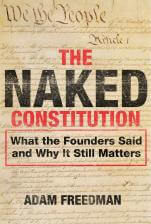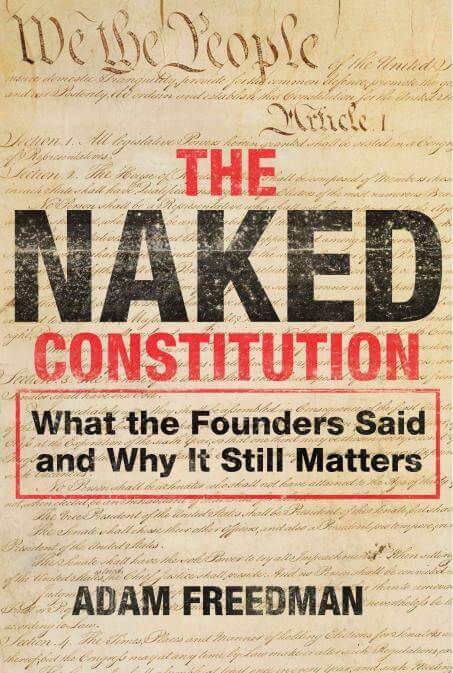Constitution 101: Freedom of Speech (Part 2)
The First Amendment guarantees freedom of speech, but what are the limits? Can Congress restrict the political speech of corporations? Find out in part 6 of Legal Lad’s series about the U.S. Constitution.

by Adam Freedman
Today’s Topic: Constitution 101 – Freedom of Speech, part 2, political speech
And now, your daily dose of legalese: This article does not create an attorney-client relationship with any reader. In other words, although I am a lawyer, I’m not your lawyer. In fact, we barely know each other. If you need personalized legal advice, contact an attorney in your community.
Constitution 101
This is the sixth installment of a new series on the U.S. Constitution and the Bill of Rights. For more on the Constitution, you can check out new book, The Naked Constitution: What the Founders Said, and Why it Still Matters.
The First Amendment and Political Speech

This was the issue at the heart of the Supreme Court’s 2010 decision in Citizens United v. Federal Election Commission, a case so controversial that President Barack Obama actually devoted part of his January 2010 State of the Union address to declaring his disagreement with the Court’s ruling. Many political observers believe that the decision’s impact on campaign finance law could be a game-changer in the November 2012 general election.
Does Money Equal Speech?
You might be wondering what campaign contributions have to do with speech. The Supreme Court, however, has long held that free expression includes the freedom to spend money to further your expression. For example, heavy taxes on newsprint and paper have been struck down on First Amendment grounds; similarly, a law that made it very difficult to build a website or produce a podcast would likely come under heavy scrutiny. For the same reason, the ability to spend money on political speech is often regarded as tantamount to being able to engage in political speech.
Congress Can Act to Battle Corruption
Laws that restrict political spending are content-specific, that is, they single out a particular type of speech for regulation. As I explained in the last episode, content-based regulations are subject to “strict scrutiny.” That is, such laws must further a “compelling” governmental interest and they must be “narrowly tailored” to achieve that compelling interest.
In the landmark 1976 decision in Buckley v. Valeo, the Supreme Court held that limits on campaign contributions could be justified based on the government’s “compelling” interest in avoiding corruption – indeed, even “the appearance of corruption – in elections. In the following years, Congress passed a variety of campaign finance limits, culminating in the 2002 McCain-Feingold Act, which, among other things, made it a federal crime for corporations and unions to use their general treasury funds to “expressly advocate” the election or defeat of a federal candidate. Corporations and unions that wanted to engage in such advocacy had to form a Political Action Committee, or PAC – a highly regulated entity.
But Congress May Not Suppress Corporate Speech
In the 2010 Citizens United decision, the Supreme Court struck down those portions of McCain-Feingold that prohibit corporations and unions from engaging in political speech. The Court did not strike down other campaign finance regulations – laws that require disclaimers and disclosures for corporate political contributions, for example, are still in effect. However, the Court held that Congress may not “suppress” corporate political speech altogether.
Are Corporations Persons?
Much of the criticism of Citizens United focuses on the assertion that the Court treated corporations as “persons” under the First Amendment. Since corporations cannot really exercise the rights and duties of natural persons, like voting, critics say that the Court made a big mistake in extending First Amendment rights to corporations.
But that’s not how the majority of the Court saw the issue. According to the Court, a corporation is just one of the many ways in which individuals choose to associate. The First Amendment protects people who speak individually, but also people who speak in groups – whether they be incorporated or unincorporated. Moreover, corporations do get the benefit of other constitutional protections – for example, a police search of a corporate headquarters would be subject to the Fourth Amendment’s prohibition against “unreasonable” searches.
Thank you for reading Legal Lad’s Quick and Dirty Tips for a More Lawful Life.
If there’s a recent college grad or senior on your gift list, give them Quick and Dirty Tips for Life After College!
This essential guide gives any student or recent grad the tools they need to bridge the gap between graduation day and the “real world.” It’s not only incredibly useful and practical, it’s cheap! Just $3.99 for a jam-packed ebook. With Quick and Dirty Tips for Life After College, you learn the do’s and don’ts of your first job, how to improve your career prospects, how to organize your life, how to stock a healthy kitchen on a budget, and much more. There’s even a chapter by Legal Lad on the perennial question: Should I go to law school? The ebook is available now on Amazon, Barnes & Noble, and iTunes for just $3.99.
You can send questions and comments to legal@quickanddirtytips.comcreate new email. Please note that doing so will not create an attorney-client relationship and will be used for the purposes of this article only.

